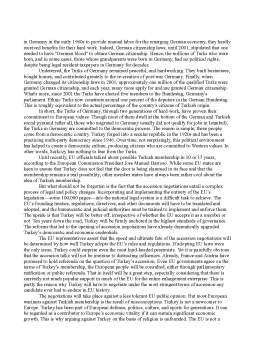Extras din referat
From a historical point of view, Turkey's desire to associate itself to the European Union dates back to the 1960's, when the country signed an “Agreement Creating An Association Between The Republic of Turkey and the European Economic Community”, also known as the Ankara Agreement. By signing this agreement, Turkey wanted to become integrated to the customs union of the EEC and, eventually, to acquire the membership. But it was not until the 1970's that a timetable for the abolition of tariffs and quotas on goods traded between Turkey and the EEC was established.
The next important step in strengthening Turkey's relations with the EU as made in December 2002, with the occasion of the Copenhagen European Council. According to it, “ the EU would open negotiations with Turkey without delay if the European Council in December 2004, on the basis of a report and a recommendation from the Council, decides that Turkey fulfills the Copenhagen political criteria.” Thusly, the negotiations would begin in 2005, at the recommendation of the European Commission.
However, the talks about its accession have been delayed due to a number of domestic and external problems. In this sense, Austria and France took some measures, saying they would hold national referenda on Turkey's accession. France went even further, having, for a while, a change in its constitution, which was made to impose such a referendum. Another important obstacle is represented by the Cyprus dispute, which scaled from a colonial dispute over the Turkish occupied Northern part of Cyprus, to an ethnic dispute between the Turkish and the Greek islanders. All these setbacks led to the EU freezing talks in 8 of the 35 key areas under negotiations, in December 2006.
It goes beyond arguing that there are both reasons to accept Turkish membership and also reasons not to. From a geographical point of view, Turkey lies on the Anatolian Peninsula, but a small part of Western Turkey lies in Europe. However, its capital city, Ankara, is entirely outside of Europe. Among those who encourage its membership, the reasons for doing so are considered to be the numerous advantages it might bring to the Union. From an economic perspective, Turkey has known an incredible economic growth in the last years. It is a member of OECD, WTO and G20 and disposes of a solid financial system, which was not affected by the recent crisis. Another important aspect, considering its geographical position, is the fact that it offers access to the Middle-East, Central Asia and the Caucasus, neighboring the most important states and regions ensuring nearly 70% of the total energy allotted to the EU.
Politically speaking, Turkey is becoming more and more necessary to the Union as it helps maintaining peace in the Middle-East and it is believed that it would also integrate nearly 20 million Muslims living in host societies in the EU. It also disposes of a powerful military force, being the second most powerful member state of NATO after USA. Turkey is considered to be a challenge, especially because of its ever-growing population of over 72 million, a relatively strong economy, which was not affected by the crisis and regional political ambitions. It is not its religious identity that is considered a threat, but rather its demographical potential, that might affect the present status quo of the European institutions.
But there is not just one way to see this problem as it is not just the EU that has to fight with these stereotypes, since Turkey is also making efforts in order to convince its population of the utility of this process. If the EU is to reject Turkey, it would only prove that the Union is nothing but a Christian club, which would lead to the diminishing of EU's influence among the Muslim states. By accepting Turkey, it is considered that the Islamic extremists will give up their perception of the Union as being hostile to Islam.
There are also ideas and conceptions opposed to Turkish membership in the EU. Mostly, they emphasize the different cultural values, given the fact that 99.8% of Turkey's population is Muslim. Although the EU is not a religion-based organization, it is commonly accepted the Turkey needs to “substantially improve respect for the rights of non-Muslim religious communities to meet European standards”. Especially since there is a problem with the rights of the Kurds in Turkey. The Kurdish people have limited human rights and there are some accounts of genocides that need to stop for Turkey to be considered for European membership.
Another solid argument is that since Turkey is not in Europe, neither population-wise nor geographically, it should not become part of the EU. But the EU responds that “The EU is based more on values and political will than on rivers and mountains” and acknowledges that “geographers and historians have never agreed on the physical or natural borders of Europe.”
A third impediment to its accession is the fact that Turkey doesn't recognize Cyprus, a fully-fledged member of the EU. Eventually, it will have to acknowledge Cyprus if it wants to stand a chance as a candidate for membership.
Finally, there are some concerned that Turkey's large population would alter the balance of power in the European Union. After all, Germany's population is only at 82 million and declining and Germany is the biggest country in the EU. Consequently, Turkey would be the second largest country in the EU and would have considerable influence, that is not to say that its prospects of becoming the biggest country in the EU are large, since it has the highest growth rate. And its influence would be felt especially in the popularly-based European Parliament.
Bibliografie
http://en.wikipedia.org/wiki/Accession_of_Turkey_to_the_European_Union
http://geography.about.com/od/politicalgeography/a/turkeyeu.htm
http://civitaspoliticsblog.wordpress.com/2010/07/02/uniunea-europeana-si-turcia-incotro/
http://www.euractiv.com/en/enlargement/eu-turkey-relations-linksdossier-188294
http://news.bbc.co.uk/2/hi/4107919.stm
Preview document
Conținut arhivă zip
- Turkey - the eternal candidate to the EU.doc











